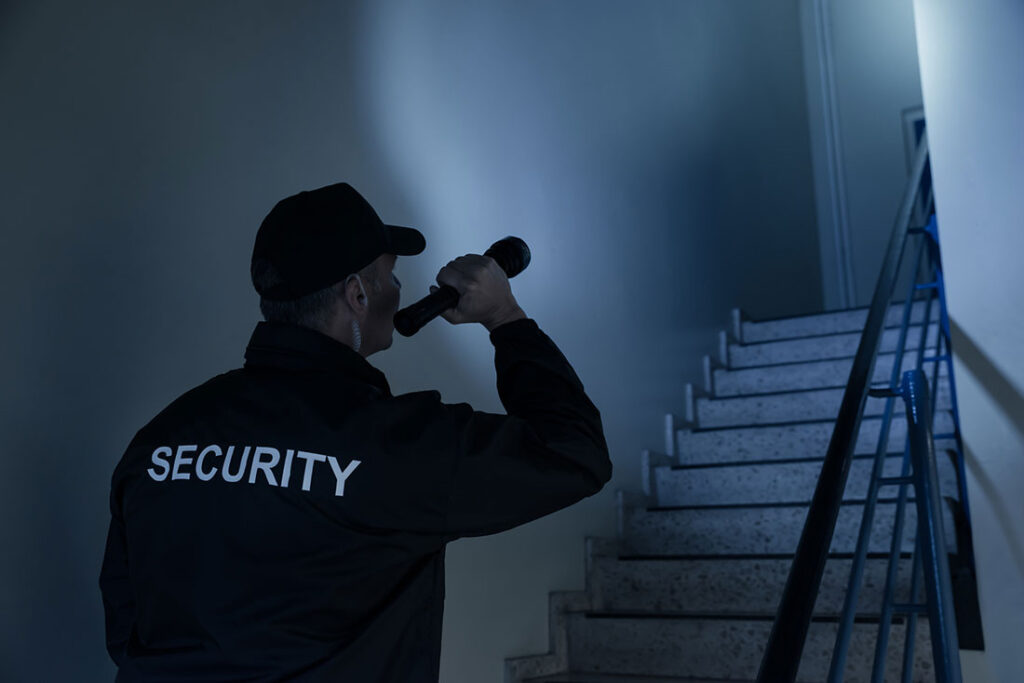If your security shift employees are struggling with the transition from day shifts to nighttime ones, it can become stressful on them.
They might feel as if they’re struggling to get their heads around adjusting to night shift patterns. This can even affect their job performance or their life outside of work due to fatigue.
But help is at hand. We have 8 superb tips to help your employees regulate their working and sleeping hours.
These pointers will teach your staff how to transition from day shift to night shift and vice versa. After all, it’s all about looking after your employees’ wellbeing.
1: Plan Ahead
Overnight security jobs often feature changing rosters which will sometimes have guards working during daytime hours and then switching to nighttime shifts. It’s crucial to help them plan ahead so that they know what they’re going to be doing, in order to schedule life accordingly.
This way, you can help them map out a pattern for their sleeping regimen, as well as helping them make plans for downtime.
Ask them to take note of precisely when they are switching from day to night or the other way around. If they make heavy personal plans on a weekend when they are transitioning, this might mean they will be over-tired for the first night shift.
On the flip side, they might find themselves with a whole extra day off when they go from nights to days. Encourage them to use this time to see family and friends and to make the most of added time that being a shift worker affords them.
It’s also worth using night shifts to get errands done in the daytime when they have caught up on sleep. Doctors appointments, getting a car serviced, getting the week’s groceries bought when the market is quiet during the weekday; these are all perks. Use them.
2: Hydrate
It’s crucial that your guards drink water whether they are on a night shift or a day shift. But it’s even more important for bodies that are switching sleep patterns.
Water is an excellent way to keep your guards awake, alert and feeling fresh. By taking a gulp from a bottle of water while driving has been known to instantly stimulate motorists on long nighttime drives.
If someone is dehydrated, sleep can be very interrupted. Urge your employees to keep a large bottle of water with them during their shifts, as it is a useful way to remain feeling fresh and will enable them to do a better job.
This will, in turn, help them to sleep better when it comes to hitting the hay.
3: Blacking It Out: Adjust Sleeping Spaces
If, when your employee finishes a night shift, it is light outside, encourage them to adjust their bedroom for daytime sleeping. It’s not only distracting to sleep with light pouring into the room, it can have a disparaging effect on the quality of sleep.
In addition, there are mental issues attached to going to bed during daylight hours, when everyone else is only just getting up and starting their day.
To resolve this, tell your employees they might want to add blackout curtains or blinds to their room, shutting out the daylight totally. They might also want to sleep with their bedroom door closed. Crack a window, even in winter, just so that a little fresh air can circulate.
And make sleeping spaces cozy and comforting, as one would want to anyway. This will all help with the body’s circulation rhythm (aka your body clock).
4: Straight to Bed?
Adjusting to night shift patterns are very much a case of what’s right for the individual. Figuring out whether they function better if they go home after the shift and head straight to bed, or whether they need to wind down a little first is extremely important.
If the latter, relax when at home. Watch the TV shows missed while at work and enjoy a relaxing beverage. Eat a snack. Wind down and treat this period of the work day as the ‘evening time’.
If this doesn’t work, head straight to bed. If they’re already tired, it’s best to just get rest right away.
5: Set an Alarm
It’s tempting on this kind of shift pattern to go to bed after work and just allow sleep for however long they want. But try to encourage your guards not to do this every time. They will feel 100 times more productive and less lethargic if they use some of the day before they start their night shift to get up and do things.
If they go to bed at 7 AM, for example, set an alarm for mid-afternoon. This way they can have a hearty breakfast, do a workout, and get other duties done before they begin work again that evening. And work out how much sleep is right for them.
6: Take a Bath After Shift
If your employees like to really unwind after a night shift, they might want to have a warm bubble bath or a shower after the shift, before they go to bed.
By simply taking a warm tub or a hot shower, they will be able to relax and feel fresh and clean, which will help them to sleep better through the day.
And make sure bedding is changed regularly so it’s comfy and clean after a long shift overnight. Home comforts like this can help immeasurably.
7: Don’t Overdo It on the Caffeine
Keep tabs on the amount of caffeine they may intake as the day and night goes on. They might be tempted to overdo it with coffee, tea, cola or energy drinks in order to stay alert and awake.
While they have every right to – just as people who work daytime shifts do too – it’s extremely important to know there’s also a crash with caffeine. And this will make them tempted to drink more of it. Don’t.
A great tip for learning about a body’s ability to handle caffeine is to test it out while on a day shift. That way they’ll know what they should be drinking during the night shift when they transition from each.
8: Plan Your Meals Properly
Food not only keeps us going and helps us with momentum when it comes to working, it can raise spirits. So ask them to plan ahead and know what foods they will be taking, and when, on a night shift.
Encourage them to try and have a larger first meal when they first wake up, and then a decent lunch, and then more of a snack as a third meal, which by this point will be closer to the time they will be heading to bed.
It’s never great to go to bed on a full stomach but equally, eating something before bedtime can help with sleep and kick-start nighttime metabolism.
If your guards stick to a routine, they’ll find it easier to revert back to daytime eating patterns too.
Help Adjusting to Night Shift Patterns
Finally, persuade them to not shy away from talking to loved ones or you about any concerns they may have. As mentioned earlier, working nights can be lonely. But it doesn’t have to be. Speak to your colleagues too and ask them for their tips on getting through it.
Be sure to tell them that if they ever suffer at all with sleep deprivation or depression because of adjusting to night shift patterns, it is important that they talk to their doctor and you immediately.
We know that the life of a security guard can be difficult and even dangerous at times! That’s we provide the best insurance coverage possible for your guards! Check it out and give us a call!






